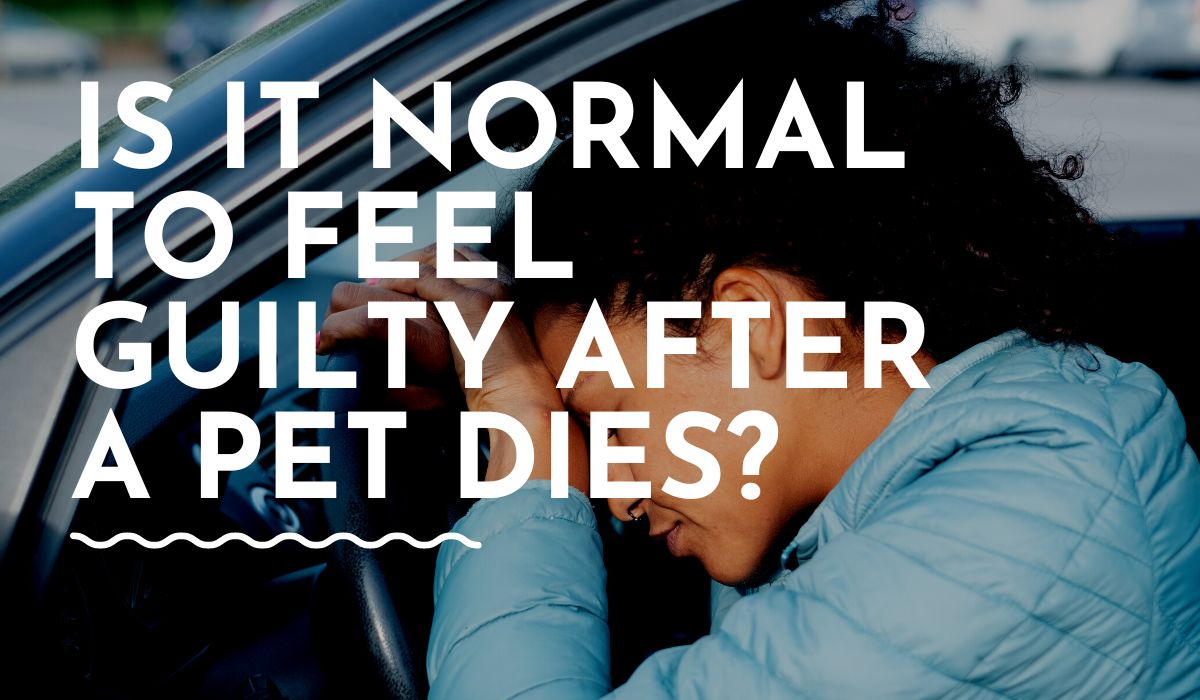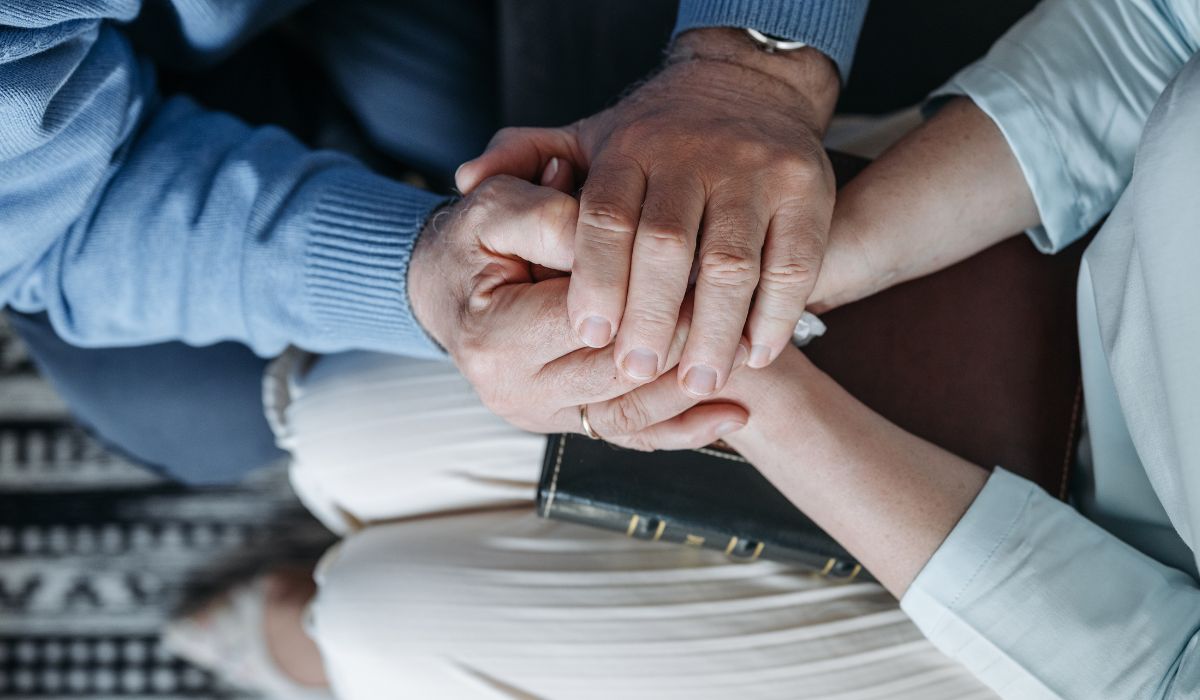Losing a pet can be incredibly hard, and it’s normal to feel many different things during this tough time.
However, one feeling that often comes up after a pet passes away is guilt.
This guilt might stem from thinking you could have done more to help your pet, feeling that you didn’t spend as much time with them as you would have liked, or even experiencing moments of laughter or joy while the pain of their passing is still fresh.
Now, while feeling some form of guilt is a normal part of grieving, focusing on the good times you shared and the love you gave them might be a more mentally uplifting way to honor your pet’s life and memory.
Therefore, in this article, we will provide a deeper explanation of the grieving process and how feelings of guilt can be a significant aspect of it, along with a few effective tips for coping with these emotions while honoring the memory of your cherished friend.

The 5 Stages of Grief After a Pet Loss
The grieving process is often described as having several stages.
While not everyone experiences these stages in the same order or to the same degree, they can provide a framework for understanding the emotions that may be experienced after the loss of a pet.
Some common stages of grief include:
Denial: Initially, there might be disbelief or denial of the pet’s passing, with some struggling to accept the reality of the loss.
Anger: Feelings of anger towards oneself, others, or even the circumstances surrounding the pet’s death can arise as part of the grieving process.
Bargaining: It’s common to contemplate “what-if” scenarios or bargain with higher powers in an attempt to reverse the loss.
Depression: Deep sadness, loneliness, and a sense of emptiness are prevalent in this stage as the reality of the pet’s absence sets in.
Acceptance: Over time, acceptance of the loss occurs, allowing for the beginning of healing and adaptation to life without the pet physically present.
Apart from understanding these emotions, it’s also important to remember that the grieving process is not linear, and moving back and forth between stages is quite normal.
Emotions After Losing a Pet
While going through the stages of grief in no particular order, there’s a range of emotions you may find yourself experiencing on a daily basis or at specific moments when you may be exposed to a trigger, such as catching a glimpse of your departed pet’s favorite toy or unintentionally calling your other pet by the name of your beloved companion.
Here are some of them:
Guilt: Feeling guilty about made decisions, perceived shortcomings in care, or not spending enough quality time with the pet.
Sadness: Overwhelming feelings of sadness and sorrow, missing the companionship and unconditional love the pet provided.
Loneliness: A profound sense of loneliness can accompany the absence of the constant presence and comfort the pet once offered.
Relief: In cases of prolonged illness or suffering, relief from seeing the pet in pain is a complex emotion that can mingle with grief.
Nostalgia: Fond memories flood back, bringing smiles and tears as individuals reminisce about the happy moments shared with their pet.
Navigating these emotions and stages of grief after losing a pet is a unique and personal journey for each individual.
It’s essential to allow oneself to grieve, seek support from loved ones, and honor the memory of the pet in ways that bring comfort and closure.
Remember, the depth of grief reflects the depth of love shared, and healing takes time, patience, and self-compassion.
Why Do We Feel Guilty After Pet Loss?
Guilt is a common and complex emotion experienced by many individuals after the loss of a pet. Here are some reasons why people may feel guilty following the passing of a beloved companion:
Decision-Making: Pet owners often second-guess their decisions regarding pet care and treatment, leading to feelings of guilt and self-blame.
Choosing Euthanasia: Pet owners who choose to give their pet a dignified death by euthanasia are most likely to struggle with feelings of guilt post-loss.
Attachment and Bond: The deep emotional bond shared with a pet can intensify guilt, as individuals may feel they could have done more to prevent their pet’s suffering or prolong their life.
Responsibility: Owners may feel a profound sense of responsibility for their pet’s well-being and may blame themselves for being unable to prevent their pet’s death.
Unresolved Issues: Any unresolved issues or conflicts with the pet before their passing can contribute to feelings of guilt, as individuals may regret not addressing these issues sooner.
Lack of Closure: In some cases, suddenly losing a pet, not being present during the pet’s final moments, or not saying goodbye can trigger guilt and feelings of inadequacy.
Understanding that guilt is a natural part of the grieving process can help individuals come to terms with their emotions and begin the healing process.
How to Cope With the Feeling of Guilt After Losing a Pet

Develop Personal Self-Care Strategies
Self-care differs for everyone, and developing habits and rituals that help you feel better on a day to day basis is important during this difficult time.
Therefore, consider allowing yourself the time to grieve, feel your emotions, and practice self-compassion and kindness when dealing with them.
Additionally, while trying to uplift the psychological, don’t forget to take care of your physical health by eating well, exercising, and getting enough sleep.
Finally, consider practicing relaxation techniques such as meditation or deep breathing exercises to help you ground yourself and shift your mindset toward healing.
Again, while self-care will look different for everyone, however, these are a few good places to start shaping your unique healing journey.
Seek Support
Reaching out to friends, family members, or even coworkers can provide you with a sense of connection and understanding and help you on your healing journey.
Additionally, exploring professional support options such as therapy or counseling is another great way to obtain a listening ear that could bring immense relief and validation during your grieving process.
Journal
Journaling can be a comforting way to express your emotions, especially during lonely nights when the spot on your bed that once held the warm presence of your beloved companion now sits cold and empty.
Pouring your thoughts onto paper or even just your notes can provide solace and a sense of connection, helping you navigate the emptiness you may feel without your beloved pet.
Read Grief Books
Exploring grief books can provide valuable insights and support during difficult times, especially when coping with the loss of a beloved pet.
These books offer perspectives, coping mechanisms, and stories that resonate with your own experience of grief.
They can help you feel understood and less alone and provide guidance on navigating the complexities of mourning.
Consider choosing books that address pet loss specifically or explore grief and healing in a broader context.
Reading about others’ journeys through grief can offer comfort, validation, and new ways to process your emotions.
Find a Hobby
Engaging in a new hobby can be a fulfilling way to channel your energy and emotions, especially during times of grief and loss.
Consider exploring activities you have never tried before, whether painting, gardening, cooking, or learning a musical instrument.
Hobbies can provide a positive outlet for your emotions, encourage personal growth and self-expression, and can serve as a welcome distraction and a source of relaxation during moments of sadness.
Volunteer at an Animal Shelter
Volunteering at an animal shelter can be a deeply rewarding way to honor your beloved pet’s memory while positively impacting the lives of other animals in need.
Spending time caring for and interacting with shelter animals can provide a sense of fulfillment, companionship, and purpose during your healing process.
By volunteering, you not only offer your time and love to animals awaiting forever homes but also contribute to the well-being of these vulnerable creatures.
The act of giving back in this way can bring comfort, healing, and a renewed sense of connection to the animal community.
Create a Memorial for Your Pet
Creating a memorial for your pet can be a beautiful and healing way to honor their memory and celebrate the special bond you shared.
Consider these heartfelt ideas to commemorate your beloved companion:
Memory Collage: Compile photos, mementos, and keepsakes of your pet to create a collage that captures their life and the moments you shared together. Display it in a frame or dedicate a space in your home to showcase this tribute.
Plant a Tree or Flower: Planting a tree or flower in your pet’s memory can symbolize growth, life, and eternal love. Choose a plant that holds significance to you and create a garden space dedicated to your furry friend.
Personalized Keepsake: Design a personalized keepsake, such as a custom piece of jewelry, engraved stone, or artwork that embodies the essence of your pet. This tangible reminder can bring comfort and serve as a lasting tribute.
Write a Letter or Poem: Express your feelings through a heartfelt letter or poem dedicated to your pet. Pour out your emotions, memories, and gratitude in words that reflect the depth of your connection.
Donate in Their Name: Make a donation to an animal charity or shelter in your pet’s name as a way to give back and support other animals in need. This act of kindness can honor your pet’s legacy and positively impact the lives of other animals.
Join Grief Support Groups
Joining grief support groups can provide valuable emotional support, understanding, and a sense of community during the challenging process of mourning the loss of your pet.
These groups, often consisting of individuals who have been or are currently going through the same thing as you, can offer a safe space to share your feelings and receive compassion and empathy from those who understand the depth of your grief.
Start a Social Media Page
Starting a social media page dedicated to your departed pet can be a heartfelt way to honor their memory, share moments of joy, and express your feelings in a creative and lasting manner.
This doesn’t necessarily have to be a public profile but a private space that will serve as a digital tribute where you can post photos, memories, messages, and reflections dedicated to your beloved companion and the impact they had on your life.
Create a Brand
Engaging in creative pursuits like creating a brand in your pet’s honor can serve as another therapeutic and meaningful coping strategy to help you honor your beloved companion’s memory by sharing their story with your audience and potentially helping others overcome similar hardships.